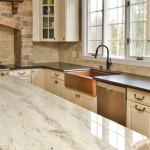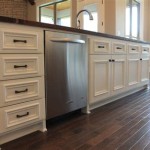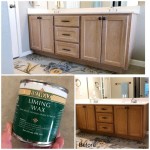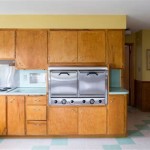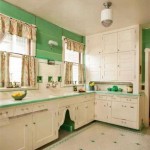Most Durable Countertops For The Kitchen
The kitchen countertop is a high-traffic surface within a home. It must withstand a variety of daily abuses, from sharp knives and hot pots to spills of various substances. Selecting the most durable countertop material is therefore a crucial aspect of kitchen design and renovation, impacting both the longevity and the aesthetic appeal of the space. The following explores several countertop materials renowned for their durability, outlining their properties, advantages, and disadvantages, ensuring a well-informed decision-making process.
Quartz Countertops: Engineered Strength and Beauty
Quartz countertops, often mistakenly referred to as "quartzite," are engineered stone products composed of approximately 90-95% ground quartz, combined with resins, polymers, and pigments. This manufacturing process results in a countertop material with exceptional durability and design flexibility. The high quartz content contributes to its hardness, making it highly resistant to scratching, chipping, and staining. The resin binders ensure a non-porous surface, preventing the absorption of liquids and bacteria.
One of the primary advantages of quartz is its low maintenance requirements. Unlike natural stone options that require regular sealing, quartz countertops are virtually maintenance-free. Spills can be easily wiped away with a damp cloth and mild detergent. This makes quartz an ideal choice for busy households with high usage and minimal time for upkeep. Furthermore, the engineered nature of quartz allows for a wide range of colors, patterns, and textures, offering design versatility to match various kitchen styles. From mimicking the look of natural marble to offering bold, contemporary colors, quartz can satisfy diverse aesthetic preferences.
However, quartz is not without its limitations. While highly heat-resistant, prolonged exposure to high temperatures can potentially damage the resin binders, leading to discoloration or scorching. It is therefore recommended to use trivets or hot pads under hot pots and pans. Additionally, while quartz is generally resistant to UV light, prolonged exposure to direct sunlight can cause fading or discoloration over time. For kitchens with large windows and significant sunlight exposure, consider opting for quartz colors with higher UV resistance or implementing window treatments to mitigate the effects of sunlight.
The manufacturing process of quartz also allows for consistent color and pattern throughout the slab. This eliminates the natural variations often found in natural stone, providing a uniform and predictable appearance. This attribute is particularly advantageous for larger kitchen islands or countertop runs where consistency is desired.
Granite Countertops: Natural Hardness and Timeless Appeal
Granite is a natural igneous rock formed deep within the earth's crust. Its inherent hardness and density make it a highly durable choice for kitchen countertops. Granite's composition, primarily consisting of quartz, feldspar, and mica, contributes to its resistance to scratching, heat, and staining. Each granite slab is unique, showcasing natural variations in color and pattern that add character and depth to a kitchen design.
The heat resistance of granite is a significant advantage. Hot pots and pans can be placed directly on the surface without causing damage. This makes granite a practical choice for avid cooks who require a durable and heat-resistant work surface. Granite is also relatively resistant to staining, but it is a porous material and requires regular sealing to prevent the absorption of liquids and bacteria. The frequency of sealing depends on the type of granite and its porosity. Darker granites tend to be less porous and require less frequent sealing than lighter granites.
While granite is a durable material, it is not impervious to damage. Sharp impacts can potentially chip or crack the surface. It is therefore important to handle heavy objects with care. The natural variations in color and pattern can also be a disadvantage for some homeowners who prefer a more uniform appearance. However, for those who appreciate the unique character of natural stone, granite offers a timeless and elegant aesthetic.
The cost of granite can vary depending on the quarry, the complexity of the pattern, and the thickness of the slab. Exotic granites with rare colors and patterns tend to be more expensive than more common varieties. It is important to consider the overall cost of the project, including the cost of the slab, fabrication, and installation, when making a decision.
Solid Surface Countertops: Seamless Integration and Repairability
Solid surface countertops are manufactured from acrylic or polyester resins mixed with mineral fillers. This combination creates a non-porous, seamless surface that is highly resistant to staining and bacterial growth. Solid surface countertops are known for their ability to be custom-fabricated into virtually any shape or design, making them a versatile option for kitchens with complex layouts. Seams can be seamlessly integrated, creating a smooth and continuous surface.
One of the key advantages of solid surface countertops is their repairability. Minor scratches and stains can often be buffed out or sanded down, restoring the surface to its original condition. This makes solid surface countertops a long-lasting investment, as they can be easily maintained and repaired over time. The non-porous nature of solid surface also makes it a hygienic choice for kitchens, as it prevents the absorption of liquids and bacteria.
While solid surface countertops are durable, they are not as resistant to scratches and heat as quartz or granite. Sharp objects can scratch the surface, and hot pots and pans can potentially scorch or melt the material. It is therefore important to use cutting boards and trivets to protect the surface. Solid surface countertops are also generally more susceptible to staining than quartz or granite, particularly from acidic substances like vinegar or lemon juice.
The aesthetic options for solid surface countertops are extensive, ranging from solid colors to patterns that mimic natural stone. However, the patterns are often less realistic than those found in natural stone or quartz. The cost of solid surface countertops can vary depending on the brand, the color, and the complexity of the fabrication. It is important to compare prices from different suppliers to ensure a competitive quote.
Stainless Steel Countertops: Industrial Strength and Hygienic Properties
Stainless steel countertops are a popular choice for commercial kitchens due to their exceptional durability, hygienic properties, and heat resistance. They are made from an alloy of steel, chromium, and nickel, which provides resistance to corrosion and staining. Stainless steel countertops are non-porous, making them easy to clean and sanitize. They are also highly resistant to heat, allowing hot pots and pans to be placed directly on the surface without damage.
One of the primary advantages of stainless steel countertops is their hygienic properties. The non-porous surface prevents the growth of bacteria and mold, making them an ideal choice for kitchens where food safety is a priority. Stainless steel countertops are also incredibly durable and can withstand heavy use and abuse. They are resistant to scratching, staining, and impact damage, making them a long-lasting investment.
However, stainless steel countertops are not without their drawbacks. They can be prone to scratching and denting, particularly from sharp objects or heavy impacts. While scratches can often be buffed out, dents may be more difficult to repair. Stainless steel countertops can also be noisy, as they tend to amplify the sound of objects placed on the surface. The industrial aesthetic of stainless steel may not appeal to all homeowners, as it can create a cold and sterile atmosphere. However, for those who appreciate a modern and minimalist design, stainless steel can be a stylish and functional choice.
The cost of stainless steel countertops can vary depending on the gauge of the steel, the size of the countertop, and the complexity of the fabrication. Thicker gauges of steel are more durable but also more expensive. It is important to consult with a qualified fabricator to ensure proper installation and welding of seams.
Concrete Countertops: Customizable and Durable (with Proper Sealing)
Concrete countertops offer a unique and customizable aesthetic, allowing for a wide range of colors, textures, and shapes. They are made from a mixture of cement, aggregates, and additives, which is poured and cured to create a solid surface. Concrete countertops are highly durable and can withstand heavy use. They are also relatively heat-resistant, although it is recommended to use trivets under hot pots and pans.
One of the key advantages of concrete countertops is their customizability. They can be cast into virtually any shape or size, allowing for unique design features such as integrated sinks, drainboards, and decorative inlays. Concrete can also be stained or dyed to achieve a wide range of colors and finishes. This allows homeowners to create a truly personalized kitchen countertop that reflects their individual style.
However, concrete countertops are porous and require regular sealing to prevent the absorption of liquids and stains. Without proper sealing, concrete can be susceptible to staining from spills of coffee, wine, or oil. The sealing process should be repeated regularly, typically every six to twelve months, to maintain the integrity of the surface. Concrete countertops can also be prone to cracking, particularly if they are not properly reinforced or if they are subjected to excessive stress. The edges of concrete countertops can also be vulnerable to chipping.
The cost of concrete countertops can vary depending on the complexity of the design, the size of the countertop, and the level of customization. Custom concrete countertops are typically more expensive than other countertop materials due to the labor-intensive fabrication process. It is important to work with a qualified concrete contractor who has experience in fabricating and installing concrete countertops.
In conclusion, selecting the most durable countertop for a kitchen involves careful consideration of various factors, including the intended use of the space, the desired aesthetic, and the budget. Each material possesses unique strengths and weaknesses, and a thorough understanding of these attributes is essential for making an informed decision.

What Is The Most Durable Countertop Type
:max_bytes(150000):strip_icc()/kitchen-countertops-cheat-sheet-1822100-02-9c82905c604141e4bb87f63c049aa686.jpg?strip=all)
35 Options For Kitchen Countertop Materials

Top 5 Most Durable Countertop Materials For Your Kitchen

The Top 5 Most Durable Countertops Micalline

Natural Vs Engineered Quartz Countertops For Your Kitchen R D Marble

15 Countertop Materials For 2024 Marble Com

What Are The Most Durable Kitchen Countertops

30 Gorgeous And Affordable Kitchen Countertop Ideas Budget Countertops

Most Durable Countertop Material 6 Choices Houselogic

Types Of Countertops The Home Depot
Related Posts

